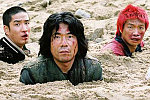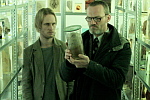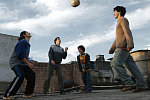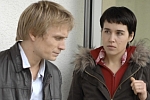 Shadows off the beaten path
Shadows off the beaten pathLINHA DE PASSE | THE SILENCE OF LORNA
< < F O R E I G N > >
last update 8.Sep.08
See also: SHADOWS FILM FESTIVAL
 R E V I E W B Y R I C H C L I N E
R E V I E W B Y R I C H C L I N E
with Cha Ye-ryeon, Lee Byeong-jun, Lee Mun-sik, Han Suk-kyu, Oh Dal-su, Kim Shi-hoo, Jeong Kyeong-ho, Shim Hyeong-tak
 release Kor 31.May.06,
release Kor 31.May.06, US 4.Jan.08,
UK 24.Oct.08
06/Korea 1h55
 Korean filmmaker Won uses a startlingly in-your-face style for this outrageous examination of bullying at all kinds of levels. Both unsettling and entertaining, it also finds real terror and black humour in the least likely places.
Korean filmmaker Won uses a startlingly in-your-face style for this outrageous examination of bullying at all kinds of levels. Both unsettling and entertaining, it also finds real terror and black humour in the least likely places.
Young-sun (Lee Byeong-jun) is a famous opera singer driving back from an audition with a young female student, In-jeong (Cha), when he's pulled over by a cop (Han). He arrogantly defies the officer and drives off the road, stopping alongside a river, where he makes a sleazy move on In-jeong. She runs away in horror, and is picked up by a smiley guy (Lee Mun-sik) on a scooter. Meanwhile, a rough-looking yokel (Oh) finds Young-sun in his car and is soon joined by two chucklehead pals (Joeng and Shim) and the teen boy (Kim) they're bullying.
This is one of those films that starts innocently, but we can tell something is badly wrong from the opening shot, and the creepy atmosphere just grows and grows. And as it evolves, small problems spin into seriously freaky situations, which then spiral completely out of control into nastiness far beyond anything the characters can imagine. Won continues this twisty, churning approach right to the very end, and by the time we get there we're as drained as the characters are. Well, the ones who survive.
What keeps this from becoming yet another violent stalker-thriller is the tone Won strikes. Everything is brightly lit in the sunny outdoors, with an anachronistic score that undermines what's happening on screen. Grisly sequences are accompanied by comical, romantic or dramatic music, rather than the usual collection of dissonant chords and jarring noises. And there are surreal moments of tenderness along the way. He also uses sharp and witty camera angles, clever editing, surprising action and exaggerated grotesquery.
And a fierce sense of irony accompanies absolutely everything that happens as the characters (and the film) get progressively ugly and brutal. Virtually everyone in this story abuses whatever power they have, including the student who knows exactly what she's doing when she flirts with her professor at the outset. And as the plot unfurls, there's a bristling connectivity between it all, a cause and effect that has much, much bigger resonance.
3.Sep.08
 R E V I E W B Y R I C H C L I N E
R E V I E W B Y R I C H C L I N E Mýrin
Mýrin
with Ingvar E Sigurdsson, Agústa Eva Erlendsdóttir, Björn Hlynur Haraldsson, Olafía Hrönn Jónsdóttir, Atli Rafn Sigurdsson, Kristbjörg Kjeld, Gudmunda Elíasdóttir, Thórunn Magnea Magnúsdóttir, Theódór Júlíusson, Thór H Tulinius, Thorsteinn Gunnarsson, Eyvindur Erlendsson
 release Ice 20.Oct.06,
release Ice 20.Oct.06, US Jan.08 psff,
UK 12.Sep.08
06/Iceland Bavaria 1h33
TORONTO FILM FEST

 Unnerving and emotional, this police thriller has an unnerving breadth and depth, as a murder case opens a decades-old inquiry that brings all kinds of dark creepiness with it. It's like an Icelandic twist on Seven.
Unnerving and emotional, this police thriller has an unnerving breadth and depth, as a murder case opens a decades-old inquiry that brings all kinds of dark creepiness with it. It's like an Icelandic twist on Seven.
When a trucker is found dead, world-weary Detective Erlendur (Ingvar E Sigurdsson) and his colleagues (Haraldsson and Jonsdottir) make some unsettling discoveries that link the murder to a 30-year-old case involving a dead child, which was so badly botched by the cops that no one wants to talk about it. Meanwhile, Erlendur is having trouble at home, as his wayward daughter Eva (Erlendsdottir) turns up pregnant. And the case leads the police to a genetic facility where researcher Orn (Atli Rafn Sigurdsson) is struggling with his own personal tragedy.
The central plot is a fairly clinical, dry police procedural drama, but it's intriguingly cross-cut with Orn and his wife (Kjeld) trying to cope with the death of their young daughter from a rare disease. This raises ethical questions about Orn's job, which is to create a genetic database in Iceland to track illnesses. (The title refers to his "library" of preserved specimens.) And as the film progresses, these two storylines, and the moods and emotions in them, merge intriguingly.
Meanwhile, writer-director Kormakur stirs in some blackly comical elements, with witty images and editing to add a counterpoint to the gloomy skies, brightly lit interiors and worn-out faces. And the setting also takes on a personality through the raw beauty of the isolated town, with dramatic mountains and seasides but virtually no sunshine. All of this adds to the deepening mystery, which gets increasingly involving as it twists and turns through various discoveries.
And the cast is terrific, giving gritty, shadowed performances that suggest difficult lives and inner turmoil. In a small community like this, everyone's stories are intertwined, whether they know it or not, and Kormakur layers in more macabre humour through the clash of generations and the central idea that both physical and moral flaws are passed from parent to child. In this sense, the conclusion is extremely provocative, challenging our notions of who's innocent and who's the real villain. If there is one.
1.Sep.08
 R E V I E W B Y R I C H C L I N E
R E V I E W B Y R I C H C L I N E
scr George Moura, Daniela Thomas, Bráulio Mantovani
with Sandra Corveloni, Vinícius de Oliveira, Joao Baldasserini, José Geraldo Rodrigues, Kaique Jesus Santos

release UK 26.Sep.08
08/Brazil Pathe 1h48
CANNES FILM FEST
 This story of four brothers in São Paulo has a lively neorealist vibe that's utterly involving. And the characters are so vividly drawn by the filmmakers and cast that their mixture of hope and hopelessness really gets under our skin.
This story of four brothers in São Paulo has a lively neorealist vibe that's utterly involving. And the characters are so vividly drawn by the filmmakers and cast that their mixture of hope and hopelessness really gets under our skin.
Cleuza (Corveloni) has four sons, plus a baby on the way, by various unknown fathers. All are looking for a way out of their poor neighbourhood. At 18, Dario (de Oliveira) is already too old to be considered as a potential football star, despite his obvious talent. Denis (Baldasserini) is a ladies' man who works as a motorbike courier and has come up with an illicit way to make extra cash. Dinho (Rodrigues) has found religion and is trying to stay straight. And the younger Reginaldo (Santos) is obsessed with a bus driver he's sure is his dad.
The filmmakers set the story beautifully in a specific time and place, while drawing out dramatic themes that everyone can identify with. Cinematographer Mauro Pinheiro beautifully captures the sprawling scope of Brazil's largest city in both epic panoramas and edgy tight shots. The film bristles with life, and has a strong emotional kick as we follow this family. These are intelligent, energetic people who simply can't get a break; their relative poverty is keeping them from achieving anything in a society that operates through nepotism, bribes and crime.
And the cast members are so raw and authentic that they don't seem to be acting at all. They develop their characters with a refreshing honestly, layering wit and energy with deep yearning and a sense of raw tragedy. All of them have incredibly expressive faces; Santos is the real find, with fiery eyes and a piercing cinematic magnetism that, even at age 14, is reminiscent of a young Brad Pitt.
The title refers to the moment when football players find a hole in the defence through which they can pass the ball and score a goal. But the harsh fact is that for these bright young men there is no easy route out of their limited life. Even so, they're not willing to give up quite yet. And it's this sense of hope that makes the film far more powerful than stories that wallow in society's problems.
6.Aug.08
 R E V I E W B Y R I C H C L I N E
R E V I E W B Y R I C H C L I N E Le Silence de Lorna
Le Silence de Lorna
with Arta Dobroshi, Jérémie Renier, Fabrizio Rongione, Alban Ukaj, Morgan Marinne, Olivier Gourmet, Anton Yakovlev, Grigori Manoukov, Mireille Bailly, Stéphanie Gob, Laurent Caron, Baptiste Somin
 release Bel 27.Aug.08,
release Bel 27.Aug.08, UK 28.Nov.08, US 31.Jul.09
08/Belgium 1h45

• BEST SUPPORTING ACTOR:
Jérémie Renier
Screenplay award:
CANNES FILM FEST
TORONTO FILM FEST

 The Dardenne brothers bring their straightforward realism to this haunting story set in a shady world where marriage is exchanged for European citizenship. But in the end, the story's too bleak to coalesce into something important.
The Dardenne brothers bring their straightforward realism to this haunting story set in a shady world where marriage is exchanged for European citizenship. But in the end, the story's too bleak to coalesce into something important.
Lorna (Dobroshi) is an Albanian immigrant about to get her Belgian citizenship. Working with her "agent" Fabio (Rongione), she has married the junkie Claudy (Renier) to become legal. But the plan doesn't end there, and Lorna's having second thoughts about the next step. Mainly because she has a heart, unlike Fabio, his young sidekick (Marinne) or her boyfriend (Ukaj), with whom she also has plans. So she begins help Claudy kick his habit, but no matter how strong-willed she is, Lorna realises she may not have the power to take control of her own life.
The story's themes are taken straight from the headlines: fast-talking men luring Eastern Europeans with big promises that amount essentially to slavery. And this film ingeniously explores the very edge of this situation, with a woman who seemingly has all the freedom in the world, including European citizenship, and yet is still told exactly what she has to do next. The Dardennes vividly capture this vicious irony, examining the harsh truth with an almost offhanded tone that combines compassion and humour with a steely battle of wills.
Dobroshi and Renier have terrific chemistry at the centre of the storm--married in name only, although Claudy relies entirely on Lorna to help him get clean. And she comes to rely on him as well, for very different reasons. Both performances are raw and riveting, especially as the story gets increasingly tense. These are difficult, complex, layered roles that deepen as the story progresses and are frighteningly balanced by the more steely edged characters around them.
The Dardennes capture this with their usual long takes and no background music, following the characters so tightly that we can see their inner struggles and silent yearnings. As the events tighten in on Lorna, glimpses of tenderness are overwhelmed by moments of nasty violence and shocking emotional turmoil. This is a provocative, wrenching story of humanity pushed beyond any sense of hope.
7.Jul.08


See also: SHADOWS FILM FESTIVAL
© 2008 by Rich Cline, Shadows
on the Wall